OpenHarmony 系统移植最核心的步骤是内核的移植,内核的稳定是一切子系统稳定的基础,上一篇我们讲述了内核启动原理,以及 vendor、board 的开发配置,本文将介绍 SoC 层级的移植适配流程。
SoC 适配
SoC 配置芯片层级编译依赖库,包括 CMSIS、HAL(硬件抽象层)等,这里包含操作总线、串口、时钟、寄存等库函数。
①创建对应的文件目录结构
目录名称按照芯片厂家、芯片型号来创建,比如 st 公司下的 stm32f4xx 系列芯片。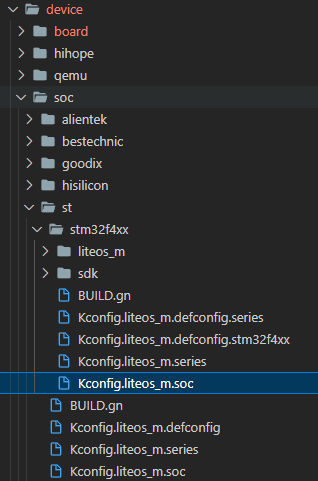
配置文件内容如下:
device/soc/st/stm32f4xx/Kconfig.liteos_m.defconfig.series ifSOC_SERIES_STM32F4xx rsource"Kconfig.liteos_m.defconfig.stm32f4xx" configSOC_SERIES string default"stm32f4xx" endif device/soc/st/stm32f4xx/Kconfig.liteos_m.defconfig.stm32f4xx configSOC string default"stm32f4xx" dependsonSOC_STM32F4xx device/soc/st/stm32f4xx/Kconfig.liteos_m.series configSOC_SERIES_STM32F4xx bool"STMicroelectronicsSTM32F4xxseries" selectARCH_ARM selectSOC_COMPANY_STMICROELECTRONICS selectCPU_CORTEX_M4 help EnablesupportforSTMicroelectronicsSTM32F4xxseries device/soc/st/stm32f4xx/Kconfig.liteos_m.soc choice prompt"STMicroelectronicsSTM32F4xxseriesSoC" dependsonSOC_SERIES_STM32F4xx configSOC_STM32F407 bool"SoCSTM32F407" Endchoice device/soc/st/Kconfig.liteos_m.defconfig rsource"*/Kconfig.liteos_m.defconfig.series" device/soc/st/Kconfig.liteos_m.defconfig rsource"*/Kconfig.liteos_m.series" device/soc/st/Kconfig.liteos_m.soc configSOC_COMPANY_STMICROELECTRONICS bool ifSOC_COMPANY_STMICROELECTRONICS configSOC_COMPANY default"st" rsource"*/Kconfig.liteos_m.soc" endif#SOC_COMPANY_STMICROELECTRONICS device/soc/st/BUILD.gn if(ohos_kernel_type=="liteos_m"){ import("//kernel/liteos_m/liteos.gni") module_name=get_path_info(rebase_path("."),"name") module_group(module_name){ modules=["stm32f4xx"] } } device/soc/st/stm32f4xx/BUILD.gn if(ohos_kernel_type=="liteos_m"){ import("//kernel/liteos_m/liteos.gni") module_name=get_path_info(rebase_path("."),"name") module_group(module_name){ modules=["liteos_m","sdk"] } }
②移植 HAL 库函数等文件
对于 STM32F407 我们可以使用官方的 STM32CubeMX 生成对应的标准的 hal 库函数文件。
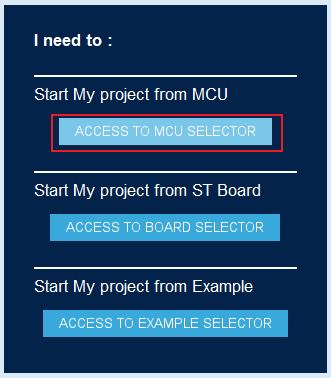
勾选 Arm Cortex-M4→STM32F4→STM32F407ZGTx:
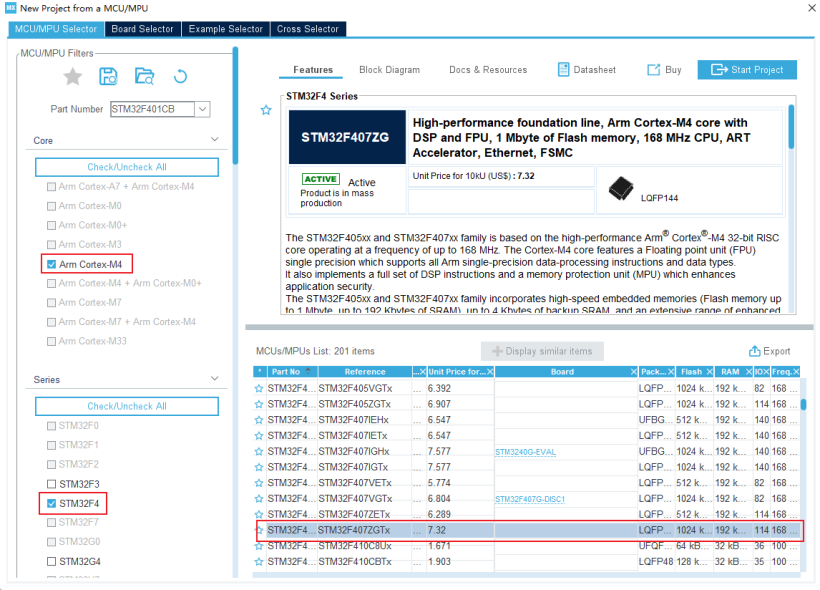
填写工程名称,选择工程保存路径,选择 Makefile 作为编译工具,点击 GENERATE CODE 生成工程代码。
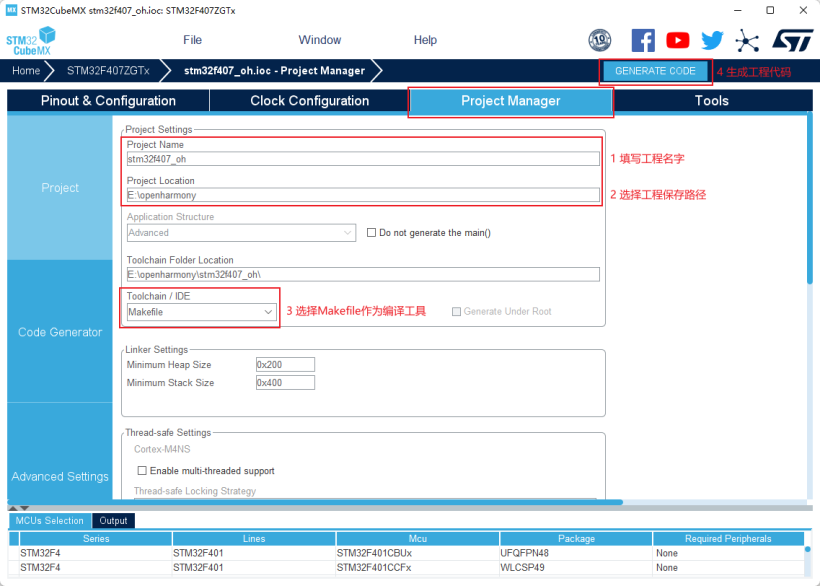
使用 vscode 打开目录,我们得到如下工程:
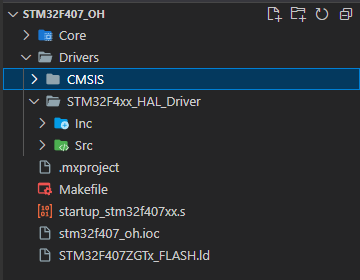
回顾一下之前讲过的系统启动的流程:
HAL 初始化
系统时钟初始化
系统初始化
系统启动
接下来我们将 HAL 库函数文件及芯片头文件迁移到 OH 代码中,文件路径如下:
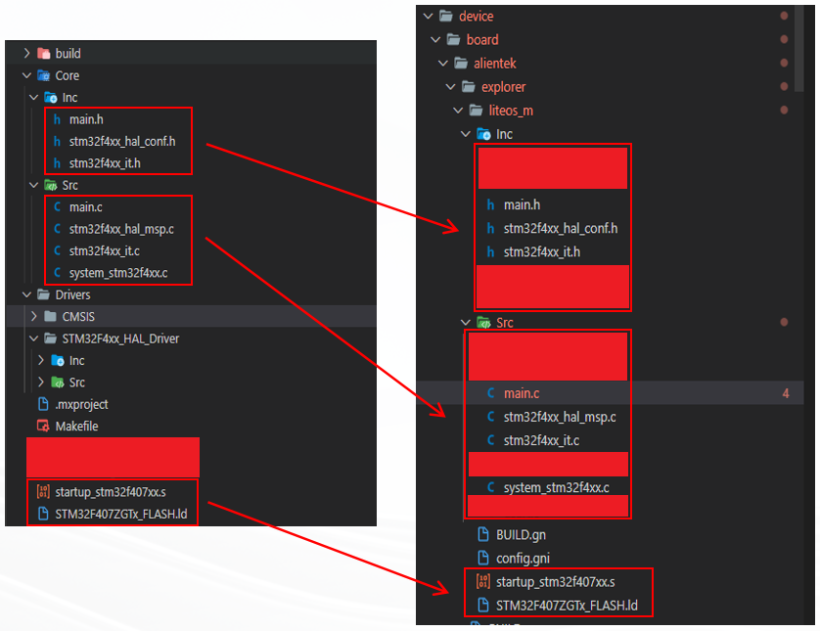
将 Drivers 中的 CMSIS、STM32F4xx_HAL_Driver 复制到 /device/soc/st/stm32f4xx/sdk/Drivers 中。
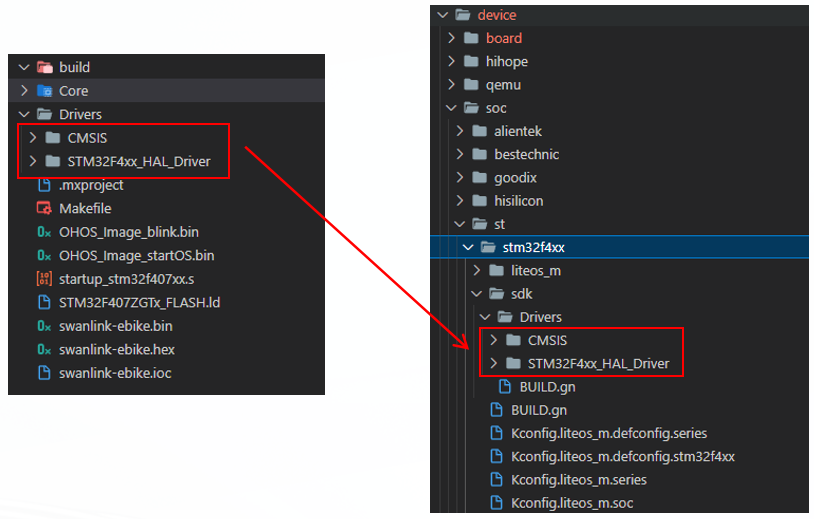
③修改系统编译配置文件
使用 OH 的 gn 以及 config 文件配置系统编译流程以及包依赖关系,涉及到的配置文件如下:
device/board/alientek/explorer/liteos_m/config.gni#Kerneltype,e.g."linux","liteos_a","liteos_m".kernel_type="liteos_m"#Kernelversion.kernel_version="3.0.0"#BoardCPUtype,e.g."cortex-a7","riscv32".board_cpu="cortex-m4"#Boardarch,e.g."armv7-a","rv32imac".board_arch=""#Toolchainnameusedforsystemcompiling.#E.g.gcc-arm-none-eabi,arm-linux-harmonyeabi-gcc,ohos-clang,riscv32-unknown-elf.#Note:Thedefaulttoolchainis"ohos-clang".It'snotmandatoryifyouusethedefaulttoolchain.board_toolchain="arm-none-eabi-gcc"use_board_toolchain=true#Thetoolchainpathinstalled,it'snotmandatoryifyouhaveaddedtoolchainpathtoyour~/.bashrc.board_toolchain_path=""#Compilerprefix.board_toolchain_prefix="arm-none-eabi-"#Compilertype,"gcc"or"clang".board_toolchain_type="gcc"#Debugcompileroptimizationleveloptionsboard_opt_flags=["-mcpu=cortex-m4","-mthumb","-mfpu=fpv4-sp-d16","-mfloat-abi=hard",]#Boardrelatedcommoncompileflags.board_cflags=["-Og","-Wall","-fdata-sections","-ffunction-sections","-DSTM32F407xx","-DHAL_UART_MODULE_ENABLED"]board_cflags+=board_opt_flagsboard_asmflags=["-Og","-Wall","-fdata-sections","-ffunction-sections",]board_asmflags+=board_opt_flagsboard_cxx_flags=board_cflagsboard_ld_flags=["-T${ohos_root_path}device/board/alientek/explorer/liteos_m/STM32F407ZGTx_FLASH.ld"]board_ld_flags+=board_opt_flags#Boardrelatedheadfilessearchpath.board_include_dirs=["//utils/native/lite/include"]#BoardadapterdirforOHOScomponents.board_adapter_dir=""这里的核心工作就是将原有的Makefile编译文件翻译成OH的config.gni,可以看到有很多的编译参数以及宏变量定义。修改编译依赖文件BUILD.gndevice/board/alientek/explorer/liteos_m/BUILD.gnimport("//kernel/liteos_m/liteos.gni")module_name=get_path_info(rebase_path("."),"name")kernel_module(module_name){sources=["startup_stm32f407xx.s","Src/main.c","Src/delay.c","Src/led.c","Src/sys.c","Src/usart.c","Src/stm32f4xx_hal_msp.c","Src/stm32f4xx_it.c","Src/system_stm32f4xx.c",]include_dirs=["Inc",]}#"-Wl,-T"+rebase_path("STM32F407ZGTx_FLASH.ld"),config("public"){ldflags=["-Wl,-u_printf_float"]libs=["c","m","nosys",]}device/soc/st/stm32f4xx/sdk/BUILD.gnimport("//kernel/liteos_m/liteos.gni")module_name="stm32f4xx_sdk"kernel_module(module_name){asmflags=board_asmflagssources=["Drivers/STM32F4xx_HAL_Driver/Src/stm32f4xx_hal_rcc.c","Drivers/STM32F4xx_HAL_Driver/Src/stm32f4xx_hal_rcc_ex.c","Drivers/STM32F4xx_HAL_Driver/Src/stm32f4xx_hal_gpio.c","Drivers/STM32F4xx_HAL_Driver/Src/stm32f4xx_hal_dma_ex.c","Drivers/STM32F4xx_HAL_Driver/Src/stm32f4xx_hal_dma.c","Drivers/STM32F4xx_HAL_Driver/Src/stm32f4xx_hal_cortex.c","Drivers/STM32F4xx_HAL_Driver/Src/stm32f4xx_hal.c","Drivers/STM32F4xx_HAL_Driver/Src/stm32f4xx_hal_exti.c","Drivers/STM32F4xx_HAL_Driver/Src/stm32f4xx_hal_uart.c",]include_dirs=["//device/board/alientek/explorer/liteos_m/Inc"]}#指定全局头文件搜索路径config("public"){include_dirs=["Drivers/STM32F4xx_HAL_Driver/Inc","Drivers/CMSIS/Device/ST/STM32F4xx/Include",]}
④改造 main 函数,拉起系统内核
我们对 device/board/alientek/explorer/liteos_m/Src/main.c 文件进行如下编辑:
intmain(void) { HAL_Init();/*初始化HAL库*/ sys_stm32_clock_init(336,8,2,7);/*初始化时钟频率168Mhz*/ delay_init(168);/*延时初始化*/ printf("hal、系统始终初始化完毕,开始启动系统... "); RunTask(); } voidRunTask() { unsignedintret; ret=LOS_KernelInit();//初始化LiteOS系统 if(ret!=LOS_OK) { printf("Liteoskernelinitfailed!ERROR:0x%x ",ret); } else { LOS_Start();//启动系统 } ... }
编译与烧录
使用 hb 工具进行编译,hb set 选择编译目标,hb build -f 执行编译。
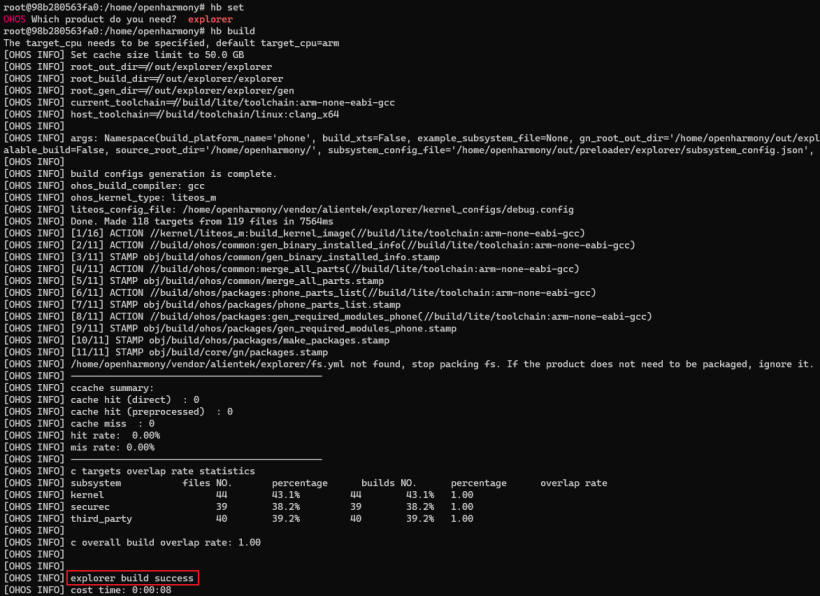
日志输出 explorer build success 表示编译成功。 编译过程中可能会遇到缺少某些结构体或者函数的定义,需要细心排查,注意宏定义是否打开。 STM32F407 开发板支持串口和 ST-LINK 烧录方式,但 OH 编译出来的是 bin 文件,bin 无法直接通过串口烧录。
需要用到 ST-LINK 工具进行烧录,烧录时需要指定 flash,开始地址:0x08000000,大小:0x100000。
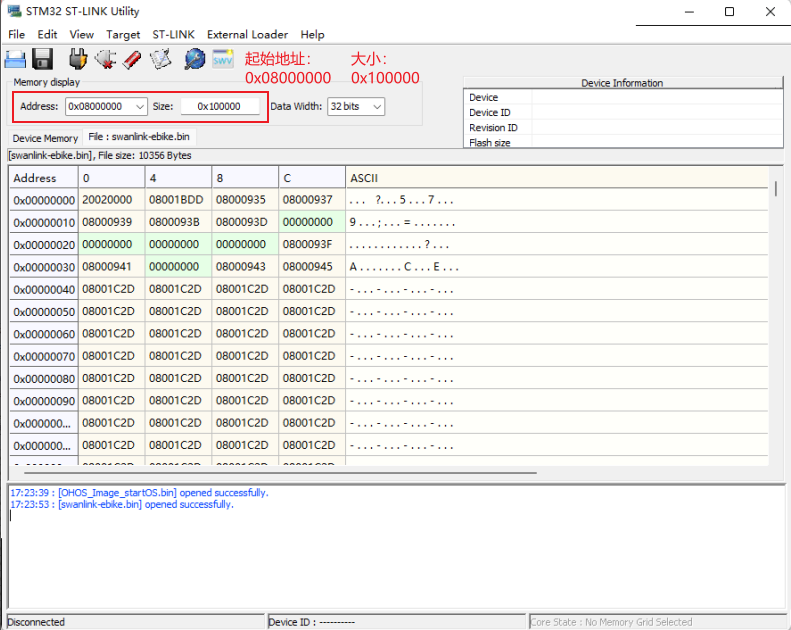
开始烧录:
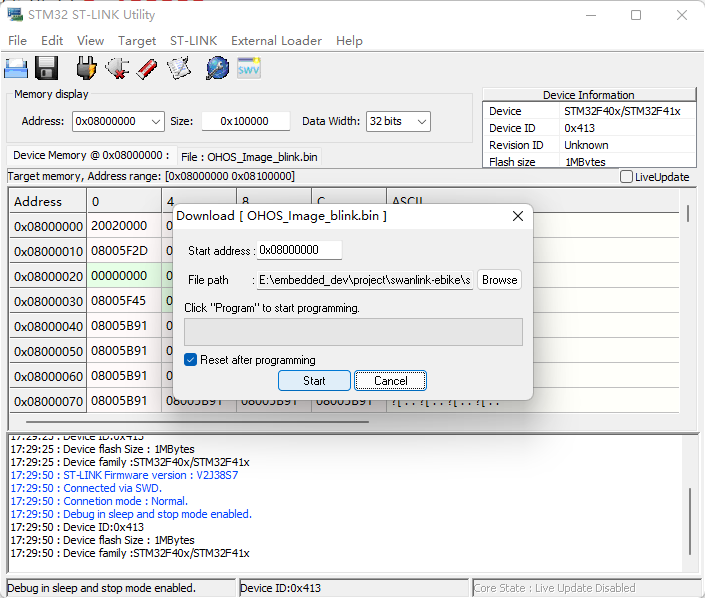
点亮开发板:
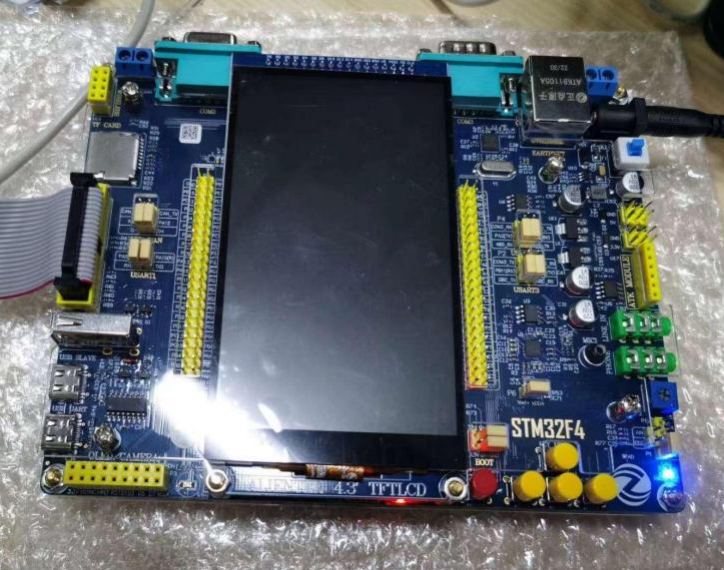
总结
本文主要讲述了 OpenHarmony 内核的 SoC 代码移植。因为 STM32F407 的架构和基础 SDK 都是官方开源的,所以移植工作也较为容易。 但在实际工作中如果遇到未开源的芯片,那么需要模组或芯片厂商提供技术支持才可完成移植工作。 到这里瘦设备 OH 适配的最核心工作已完成,希望能对热爱 OpenHarmony 的小伙伴有所帮助。
审核编辑:汤梓红
-
内核
+关注
关注
3文章
1372浏览量
40273 -
soc
+关注
关注
38文章
4161浏览量
218149 -
移植
+关注
关注
1文章
379浏览量
28124 -
鸿蒙
+关注
关注
57文章
2339浏览量
42802 -
OpenHarmony
+关注
关注
25文章
3713浏览量
16251
发布评论请先 登录
相关推荐
Flutter 在鸿蒙系统上移植的小成本实现案例解析
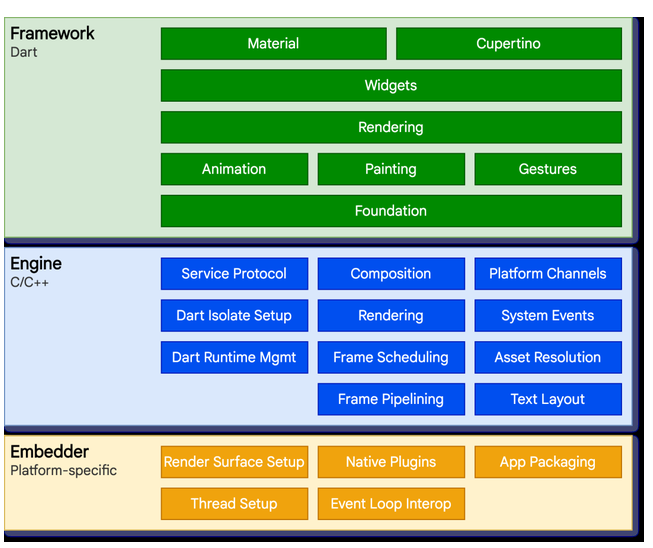
OpenHarmony瘦设备内核移植实战(一)
鸿蒙系统开始适配游戏 适配完毕的游戏会有啥体验
基于鸿蒙组件适配移植的流式布局

鸿蒙适配移植的开源SnackBar消息弹框教程
鸿蒙第三方组件适配移植的滑动验证码教程
基于鸿蒙适配移植的开源视频缓存引擎项目案例
基于openharmony适配移植的搜索控件
基于openharmony适配移植的圆形视图教程
基于鸿蒙适配移植的开源弹幕解析绘制引擎项目
基于鸿蒙适配移植的广告图片轮播控件教程
鸿蒙富设备移植指南:编译框架适配
OpenHarmony瘦设备内核移植实战(一)





 鸿蒙瘦设备移植:SoC适配
鸿蒙瘦设备移植:SoC适配
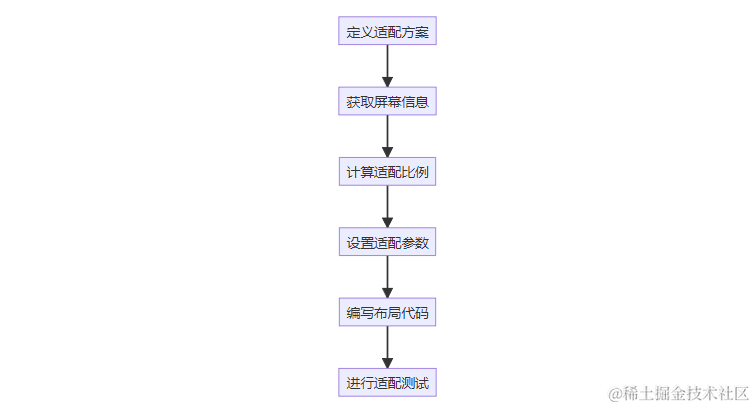










评论